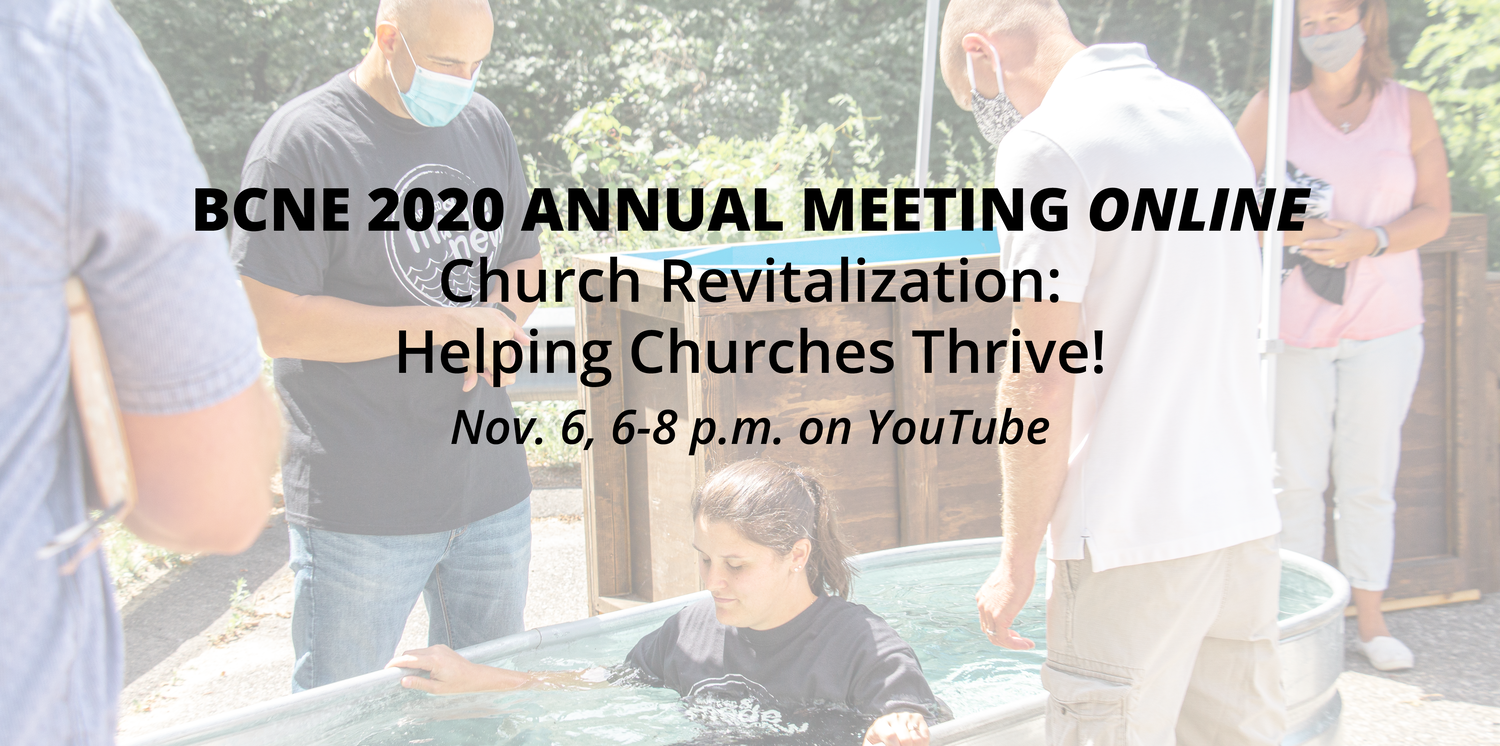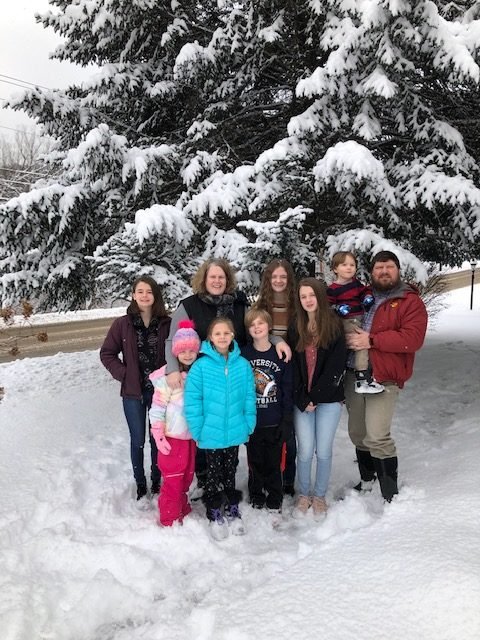
Multiplication resources
According to the BCNE 2021 annual meeting goals, we want to intentionally equip New Englanders for multiplication. Consider the following resources as you pray about how to more effectively lead your church in a pathway to multiplication.
Action steps for “Equipping New Englanders for Multiplication”
(Note: We anticipate that churches would focus on ONE of the three things below, they they would be free to select more than one if they felt led by the Spirit and God has given them the capacity.)
A. We pray that God would revitalize 20 churches (five per year) that have a commitment to healthy growth and a history of Gospel focus but have either plateaued or begun to decline in recent years. Churches would commit to joining God in this effort by:
Understanding their need for revitalization and asking for assistance from the BCNE.
Action steps: Read the article 10 Ways to Recognize the Need for Revitalization. Explore the articles related to church revitalization below. Contact Gary Moritz to learn more about how the BCNE can help your church pursue revitalization.
Taking an assessment provided by either BCNE staff members or by one of our partners.
Action steps: Take a self-assessment with this church health inventory. Get in touch with Gary Moritz to find out how you can take a revitalization needs assessment.
Agreeing to a revitalization plan that includes equipping leaders and removing obstacles that hinder.
Action steps: The BCNE can help your church walk through the four levels of revitalization. Learn more on our revitalization page, and contact Gary Moritz.
Partnering with the BCNE, the BFNE, and other churches or ministries to do evangelism projects in the community, correct building issues that might be hindering growth, and/or resolve conflicts or other issues that might be hindering growth.
Action steps: Contact your BCNE regional coordinator to discuss evangelism grants, and consider working with another local church for large-scale evangelism projects. Find out if your church is eligible for a loan to purchase or renovate a church building through the BFNE’s James Currin Mission Fund. Talk to your regional coordinator or another staff member about how the BCNE may be able to help resolve internal conflicts.
B. We pray that through collaborative efforts between the BCNE and SEND Network, 20 new churches would be planted each year (15 by SEND and 5 by BCNE). Churches would commit to joining God in this effort by:
Emphasizing the biblical principles of church planting through sermons and Bible studies at least once annually.
Action steps: Explore the articles below to learn more about church planting and church planting principles. Get in touch with Hal Haller to discuss possible ways to share the importance of church planting with your congregation.
Identifying a community that is underserved with the Gospel.
Action step: Talk to your regional coordinator and/or local evangelical pastors to identify a neighborhood or community near you with little to no evangelical witness.
Prayer walking that underserved community.
Action steps: Explore the prayer walking resources below. Consider inviting Hal Haller to host the prayer walking seminar, Walk a Mile, for your church and/or a group of churches in your area.
Researching and utilizing the assessment/training/funding systems available through the BCNE and SEND Network.
Action steps: Contact Hal Haller to learn more about the BCNE’s church planting partnership pathway. Attend one or more of the seminars in the church planting seminars section. Research the North American Mission Board SEND Network’s church planting pipeline.
Developing a contextualized leadership development plan to identify and train indigenous church planting leaders.
Action steps: Talk to Hal Haller about how your church can raise up and/or support local church planters. Attend a “Discovering Church Planting” seminar or another seminar in the church planting seminars section below.
Being equipped to be a partnering, sending or supporting church for a church plant.
Action steps: Visit our page on church planting partnerships. Contact Hal Haller about participating in a seminar on church planting partnerships. Explore the other church planting seminars listed below.
C. We pray that 40 existing New England evangelical churches who have baptistic theology and a desire to work cooperatively would affiliate with the BCNE by 2025 (10 per year). Churches would commit to joining God in this effort by:
Inviting non-BCNE pastors/leaders to attend BCNE-related events as guests and to collaborate in mission projects and disaster relief response efforts.
Action steps: Make a list of nearby pastors who are not associated with the BCNE but have similar baptistic theology. Look at the BCNE events calendar, consider what these pastors might find beneficial, and invite them to join you. Consider ways you could collaborate with them on mission or disaster relief projects, and talk to your regional coordinator or another staff member about how the BCNE can help.
Helping newly affiliated churches feel welcomed into the BCNE family.
Action steps: Introduce yourself to new people at BCNE meetings and events. When you hear about a church joining the BCNE, take a moment to send a welcome email, make an introductory phone call, or connect with the pastor on social media. Ask your regional coordinator to let you know when a church in your area joins the BCNE, then invite the pastor to coffee or lunch.
Partnering with their BCNE regional coordinator and other BCNE churches to host informational luncheons for pastors/leaders of non-affiliated churches for fellowship and to promote understanding of the benefits of BCNE affiliation.
Action steps: Talk to your regional coordinator about hosting or participating in an informational luncheon. Invite pastors in your circle who are not affiliated with the BCNE but have similar baptistic theology. Share your story of how God has used your partnership with the BCNE to equip and encourage your church.
Encouraging pastors/leaders of non-affiliated churches to start the official affiliation process.
Action steps: Review the steps to affiliation with the BCNE. Share the link and the information from the affiliation section below with a pastor you feel would benefit from being part of the BCNE, and offer to answer his questions about your experience. Connect him with your regional coordinator or another BCNE staff member for further discussions.
Church revitalization articles
Prayer walking resources
Prayerwalk Training Guide (2 page PDF from NAMB)
Prayerwalking Tips (article)
Prayerwalking Made Simple (free booklet download from NC Baptists)
Follow Me: Becoming a Lifestyle Prayerwalker by Randy Sprinkle (6-week Bible study available for purchase)
Walk a Mile: contact Hal Haller about this seminar which encourages churches to spiritually own their geography through prayer walking
New England church planting articles
BCNE church planting seminars
Contact Hal Haller to learn more.
Discovering church planting: For individuals considering church planting and churches that want to invest in a church plant.
Basic training for church planters: Nuts and bolts of church planting.
Contextual clarity: How to understand and connect with communities where a church is being planted.
Spiritual conversations: Evangelism for church planters and their core groups.
Church planting mistakes: What to avoid when planting a church.
Raising money for your church plant: Strategy for donor development and organizational funding.
Church planting partnerships: Practical ways churches can sponsor, participate in, or even send out a church plant.







































